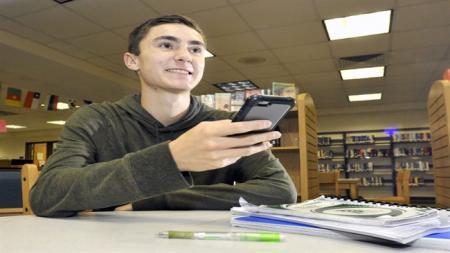
As president of his school’s chapter of the National Honor Society, vice president of the class of 2018 and a member of the cross country team, it might seem irresponsible for him to be wasting time scrolling through Twitter. But that is not the case.
According to thesunchronicle.com, once on his favorite social media site, he is able to post on the honor society’s Facebook account to let members know of upcoming meetings. He then checks his AP English homework before going back to Twitter to check the news. He opens the ‘trending’ tab and reads through the headlines — short, easy-to-digest briefs of daily events.
“I use Twitter for everything,” Lally said.
“I’m super busy and social media is really convenient.”
It has become common practice for students like Lally to use social media as a tool for learning and connecting.
A 2017 study done by the Pew Research Center found that a whopping 67 percent of Americans get their daily dose of news and current events from updates found on Twitter, Facebook, Instagram and other sites.
But even with the evidence that social media is becoming much more than a platform for gossip and wasted time, most schools still have parts of social media blocked on their computers and Wi-Fi networks.
The schools’ reasoning lies in an uncertainty over such a radical change from the anti-social media platforms they have been running on since MySpace came out in 2003.
“There is a concern about making sure that we’re not creating opportunities for students during the school day to engage in things they shouldn’t be engaging in,” said Mary Watkins, the principal at Mansfield High School.
Mansfield took longer than other schools to institute a cellphone-friendly policy, allowing limited use of devices throughout the day starting only this September.
When it comes to unblocking certain forms of social media, Watkins said, “Right now, we’re not quite there yet.” She did mention, however, that the school has plans for addressing the issue further in the future.
Julia Atwood, a history teacher at Mansfield High, agreed it could take a while to develop a new policy, but noted the importance of educating kids by utilizing tools relevant to them.
“Being able to recognize and evaluate different (news) sources is important,” she said.
Other schools shared Atwood’s view.
Joseph Baeta, the schools superintendent in Norton, has introduced social media to his district in the form of a school-run Twitter page, which is used almost daily to update students on club meetings, athletic events, and other school-related information.
He was a strong advocate for not demonizing social media based on the mistakes that are made by a few kids.
“They’re still trying to figure out what to do and what to not do,” he said, adding that he believes the majority of students are using social media in a positive manner.
Baeta’s approach focuses on emphasizing a policy of ‘digital citizenship’, which works to teach younger kids how to be responsible about managing their social media accounts.
